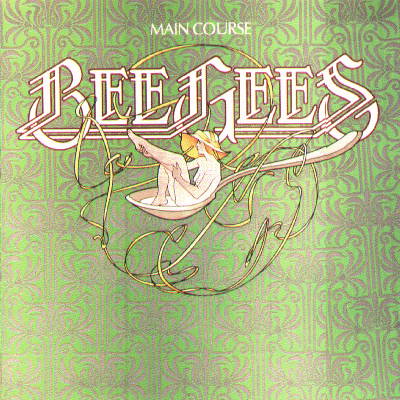 |
From the Vault...
03/01/1998
#566 |

|
info
Bee Gees
"Main Course"
© Polydor Records
Year of Release: 1975
Rating:



|
track listing
|
Nights On Broadway
Jive Talkin'
Wind Of Change
Songbird
Fanny (Be Tender With My Love)
All This Making Love
Country Lanes
Come On Over
Edge Of The Universe
Baby As You Turn Away
|
WSVNRadio Archives
Bee Gees related sites:
|
|
|
Bee Gees
"Main Course"
Long before The Bee Gees put disco on the
map, they had been around since 1967, presenting their
own sound, and it was anything but disco.
Main Course, however, released in 1975, had just
a small taste of what was yet to come. Two years later,
the soundtrack of Saturday Night Fever peaked
disco music to its full tilt. The biggest hits on Main
Course, Nights On Broadway and the #1 Jive
Talkin' are two great songs in the beginning stages of
disco for Barry, Robin, and Maurice: The Bee Gees.
The rest of the album is equally good, as the new sound
of disco was just starting to grow. Of the ten songs on
this album, less than a handful have the actual disco sound, that
would later become their trademark. The remaining tunes sounds
as where they left off from their previous 'pre-disco' albums.
Wind of Change is another good disco spinning record.
Songbird is a nice soft ballad, compared to the early
Elton John. Fanny (Be Tender With My Love) is another
favorite tune, found on many Bee Gees Greatest Hits compilations.
All This Making Love is an album track that is just
that; in my opinion, its one of the least favorite songs on this album.
Country Lanes is another slow ballad, featuring the vibrato
vocals of Robin Gibb only. Come On Over, is another
slow tune, as it features beautiful harmony vocals. The piano
and country rock-influenced guitar makes this song work so well.
Edge Of The Universe is a medium-pop sounding record,
that features Moog-sounding synthesizers. The closing song,
Baby As You Turn Away, has the high-vocal ranges that
would be featured on many future Bee Gees recordings.
Main Course is a nice sounding pop album. As many
may not like them, The Bee Gees proved before, during and after disco
that their music can be enjoyed. Many critics
have spoiled their music, hating disco, and putting
the blame on The Bee Gees for making disco famous as it
was. When disco died in the early Eighties, it seemed that the
popularity of the Bee Gees died also. But they
continued recording, despite not having as many big hits
as they did, pre-disco and during.
Still, The Bee Gees are good to listen to. Even though
their most recent albums have achieved some good or great
reviews, it seems like the disco bug has somewhat haunted
the group's career. In many of the big music magazines,
The Bee Gees can still make good records. It's too bad that
they don't have the popularity they once had. To some they do,
but not according to the record-breakers they acclaimed with
Saturday Night Fever, and the #1 songs from their album
released afterwards, Spirits Having Flown. What makes
The Bee Gees sound so good, is their ability of harmony
vocals. When they first started in the late Sixties/early
Seventies, their harmonies were excellent, much better on the slower
ballad tunes, like How Can You Mend A Broken Heart,
and I've Got To Send A Message To You. Even in the
up-beat tempo songs, including disco, their harmonies are exceptionally good.
If you ever get a chance, check out the concert they did
for VH-1, Storytellers. Their unplugged
style concert was truly excellent. Robin, along with Barry
on accoustical guitar, and Maurice on keyboards, all performed
their magical vocals and harmonies the only way they could,
performing their pre-disco hits, Saturday Night Fever
favorites, and songs from their most recent album, Still
Waters. It's a shame that their younger brother Andy,
could not join them, as he died due to complications of his drug
addiction in 1988. But despite his death, and the post-disco
era, The Bee Gees still know how to record well, whether they
record songs by themselves, or for other popular artists.
© WSVNRadio.net. All rights reserved.
Review or any portion may not be reproduced
without written permission. Cover art is the
intellectual property of
Polydor Records
and is used for reference purposes only.
|
|





